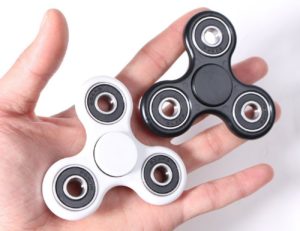
In the past year, fidget spinners won the hearts of children all over the nation. As coined by Varda Epstein of Kars4Kids Education Blog, a fidget spinner is “like small propeller attached to ball-bearings” that rotates freely while generating a soothing vibration in one’s fingertips. Advertisers claim fidget spinners to be the newest solution to channeling nervous energy and treating Attention Deficit Hyperactivity Disorder (ADHD) in children. Despite all of the fanfare surrounding their functionality, fidget spinners may prove to be more of a hindrance to your child’s education than a help.
Research shows that tactile or mind-focusing treatments can aid children experiencing symptoms of ADHD to a certain degree. In a Business Insider article, clinical psychologist Dr. Dave Anderson from the Clinical Mind Institute attests to the individual effectiveness of strategies like stress balls or music to calm to focus the mind. However, Dr. Anderson also states that “there are no universal recommendations of a particular toy for stress relief or a particular object for stress relief.“ Furthermore, there is little to no evidence that fidget spinners’ improve a child’s focus.
In fact, since fidget spinners have only enjoyed a few months of popularity, no long term study of fidget spinners’ impact on child development exists at all. Therefore, experts are unable to verify the usefulness of fidget spinners to any degree; and the extent of their potential negative effects also remains unexplored.
Many school systems have banned fidget spinners in classrooms, citing them as major distractions. Teachers feel that students utilize the fidget spinners as toys, rather than focus tools. The spinners distract pupils visually, causing the user to focus more on the spinner itself than on the lesson. School districts in both Massachusetts and Chicago were among the first to ban fidget spinners during instructional time, excluding only those students with clinically diagnosed conditions.
Without legitimate evidence to bolster the claims of fidget spinners’ effectiveness, parents might want to exercise discretion when allowing their children to bring the devices to school. Even during homework time, fidget spinners may detract from studying and prolong the time required to finish assignments. With the mounting pressures of college admissions and the delicacy of your child’s development, is the risk of a fidget spinner throwing them off of their game really worth taking?
